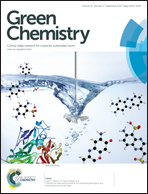Comprehensive mass analysis for chemical processes, a case study on l-Dopa manufacture†
Abstract
To evaluate the “greenness” of chemical processes in route selection and process development, we propose a comprehensive mass analysis to inform the stakeholders from different fields. This is carried out by characterizing the mass intensity for each contributing chemical or waste component with a new algorithm. The analysis is demonstrated with the evaluation of commercial processes for L-Dopa. The plan-wide impacts on inputs are estimated for design features such as the choice of starting material, the use of one-pot synthesis for multiple reactions, recycling of the wrong enantiomer, methods for intermediate isolation, and volumetric productivity. The waste effluent profile is generated to project waste management needs. It has been found that the current biocatalytic process (Ajinomoto) has the best process efficiency and minimal waste treatment needs. The mass efficiency has been improved by at least 6.5 fold through biocatalyst optimization, and reaction intensification employing the crystallization-induced equilibrium shift.


 Please wait while we load your content...
Please wait while we load your content...